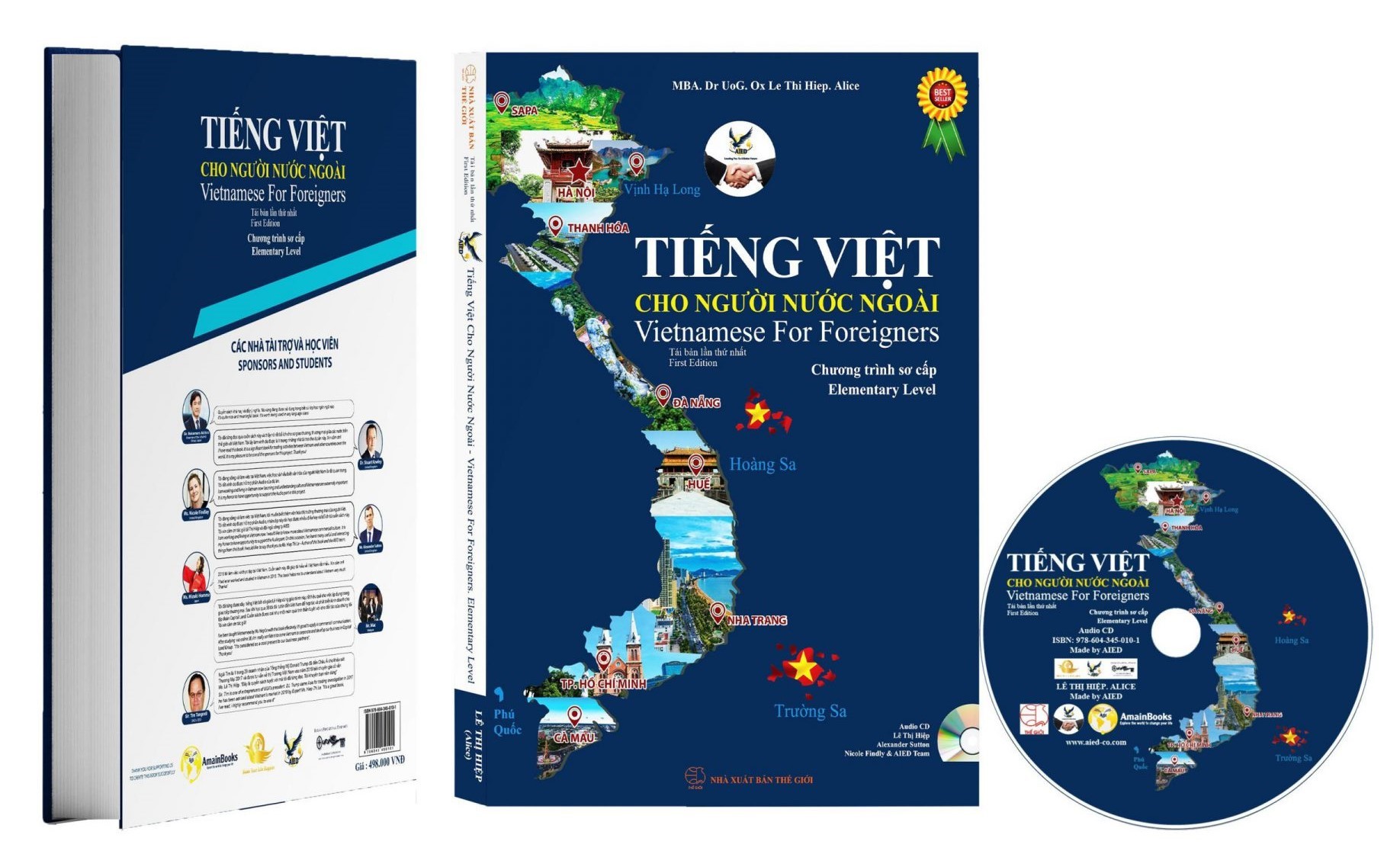Learning Path to Obtain Vietnamese Language Certification for Foreigners
Date: 2025.05.23
In the context of globalization and deep economic integration, Vietnamese is gradually becoming one of the important languages in Southeast Asia. Along with that, Vietnamese language certificates for foreigners are increasingly recognized by many organizations, businesses, and educational institutions as a measure of language proficiency.
Why should you learn and take the Vietnamese language certification exam?
✅ It’s a requirement for admission to universities and colleges in Vietnam
✅It meets recruitment requirements of domestic and foreign enterprises
✅ It improves social integration ability and effective communication with Vietnamese people
✅ It increases work opportunities, scholarships, and long-term residency in Vietnam
Whether you are an international student, a foreign expert working in Vietnam, or simply someone who loves Vietnamese language and culture, understanding the effective Vietnamese learning path will help you save time and achieve better results when taking the certification exam.
General Introduction to Vietnamese Language Certification for Foreigners
1. What is a Vietnamese language certificate?
A Vietnamese language certificate is a credential issued by the Ministry of Education and Training of Vietnam, evaluating the Vietnamese language proficiency of foreigners according to the 6-level Vietnamese Language Proficiency Framework (KNLTV). This framework is equivalent to the Common European Framework of Reference for Languages (CEFR), from level A1 to C2.
📌 Practical applications of the certificate:
・University and graduate school admission
・Job applications, visa extensions
・Vietnamese citizenship application
2. Popular Vietnamese certification systems
Below are three widely recognized and used systems:
| Certificate Name | Organizing Institution | Key Features |
|---|---|---|
| NLTV VNS (Vietnamese Language Proficiency for Foreigners) | University of Social Sciences & Humanities, HCMC | 10-point scoring for 4 skills, valid for 2 years |
| VINATEST (Vietnamese language proficiency test) | Hanoi University | Classified as A, B, C according to CEFR standards |
| VIETEST (Vietnamese language proficiency test) | University of Social Sciences & Humanities, Hanoi | High objectivity, comprehensive assessment |
3. Comparison table between KNLTV and CEFR
| KNLTV Level | CEFR Equivalent | NLTV VNS Score | Capability Description |
|---|---|---|---|
| Level 1 | A1 | 1.0 – 1.5 | Basic communication in daily life |
| Level 2 | A2 | 2.0 – 3.5 | Understand and express basic ideas |
| Level 3 | B1 | 4.0 – 5.5 | Independent language use in work environments |
| Level 4 | B2 | 6.0 – 7.0 | In-depth discussion on complex topics |
| Level 5 | C1 | 7.5 – 8.5 | Flexible use in academic environments |
| Level 6 | C2 | 9.0 – 10 | Proficient like a native speaker |
Vietnamese Learning Path from Zero – For Foreigners
According to the Foreign Service Institute (FSI), Vietnamese is classified as a difficult language (group IV) for English speakers, requiring about 1,100 hours of study to reach B2–C1 level.
Below is an effective Vietnamese learning plan, divided into three phases, to help you be more proactive in conquering the certification:
🧱 Phase 1: Building the foundation (0–6 months)
Goal: Achieve A1–A2 level (KNLTV level 1–2)
Learning content:
・Vietnamese alphabet, standard pronunciation
・Basic vocabulary, daily communication sentence patterns
・Simple listening and speaking skills
Suggested resources:
・Vietnamese learning apps such as: LingoDeer, Duolingo
・YouTube videos from Vietnamese teachers (with subtitles)
・Online or offline classes with teacher support
📘 Phase 2: Enhancing skills (6–12 months)
Goal: Achieve B1–B2 level (KNLTV level 3–4)
Learning content:
・Expand specialized vocabulary (education, economics, society)
・Practice writing paragraphs, emails, short reports
・Listen and understand medium-difficulty content
Learning methods:
・Join Vietnamese certificate preparation classes
・Practice with sample tests and online mock exams
・Practice writing diaries, sharing in Vietnamese
🎯 Phase 3: Preparing for the certificate exam (12–18 months)
Goal: Achieve C1–C2 level (KNLTV level 5–6)
Review content:
・Master 4 skills: listening – speaking – reading – writing
・Practice with real exam questions from organizing universities
・Focus on improving language reflex skills
Suggestions:
・Living, working, or interning in Vietnam is a big advantage
・Study in groups with native speakers or private tutoring.

✅ Top 5 Reputable Vietnamese Language Certificate Training Centers for Foreigners
Are you looking for a reputable and quality center to prepare for Vietnamese language certificate for foreigners? Below is a list of the top 5 centers highly rated for their teaching methods, standard curriculum, and experienced teaching staff:
1. Vietnam Studies Center – University of Social Sciences & Humanities, HCMC
・Highlights with NLTV VNS exam preparation classes, teaching according to the 6-level proficiency framework.
・Offers intensive programs and classes tailored to individual requirements.
2. Vietnamese Language & Culture Center – Hanoi University
・Specializes in VINATEST exam preparation, suitable for international students and working professionals.
3. VIETEST Center – Affiliated with University of Social Sciences & Humanities, Hanoi
・Focuses on academic exam preparation, comprehensive assessment of 4 skills.
4. Vietnamese Language Garden (VLG)
・Private center, famous for its “Immersion Learning” method – learning through practical experience.
5. Learn Vietnamese with Annie
・Online courses suitable for distance learners, with personal teacher guidance and in-depth materials for certificate exams.
💡 Note: When choosing a training center, you should consider: whether the program is suitable for your level, whether the schedule is flexible, and whether the center provides support for certificate exams.
📍 Exam Venues for Vietnamese Language Certification for Foreigners
Currently, Vietnam’s Ministry of Education & Training has authorized 16 universities and colleges to organize Vietnamese language proficiency assessment exams for foreigners. Below are some notable institutions:
🔸 Northern Region
・Hanoi University – VINATEST
・University of Social Sciences & Humanities (Vietnam National University, Hanoi) – VIETEST
・Hanoi Pedagogical University 2
・University of Languages & International Studies – Vietnam National University, Hanoi
🔸 Central Region
・University of Foreign Languages – Hue University
・University of Education – University of Danang
🔸 Southern Region
・University of Social Sciences & Humanities, HCMC (Vietnam National University, HCMC) – NLTV VNS
・HCMC University of Education
・Nguyen Tat Thanh University
・Van Hien University
📆 Latest Vietnamese Language Certificate Exam Schedule 2025
Depending on the organizing institution, Vietnamese language certificate exams for foreigners are usually held 2–4 times per year, specifically:
| Organizing Institution | Expected Exam Dates | Notes |
|---|---|---|
| Hanoi University | March, June, September, December | Preparation classes available before exams |
| University of Social Sciences & Humanities, Hanoi | May, November | Online registration, offline exams |
| University of Social Sciences & Humanities, HCMC | April, August, December | Exam schedule updated on the school website |
| University of Foreign Languages – VNU Hue | June, December | Offers exams for B1 certificates and above |
| HCMC University of Education | May, October | For candidates in the Southern region |
📌 Notes:
・Some institutions require registration 1–2 months in advance
・Exams may be postponed if the number of candidates is less than 30 people
・Update exam schedules and registration forms on each school’s official website
Effective Exam Preparation Strategies for Vietnamese Language Certificate – Tips for Each Skill
To achieve high results in the Vietnamese language certificate exam for foreigners, you need to have a clear practice plan for each skill: Listening – Speaking – Reading – Writing. Below are effective Vietnamese exam preparation strategies, derived from practical experience and modern teaching methods.
🔊 Vietnamese Listening Skills – Effective Practice Methods
Common question types in the Listening section:
・Listen and fill in the blanks
・Listen and choose true/false
・Listen and answer multiple-choice questions
Tips for effective Vietnamese listening practice for foreigners:
・Quickly note keywords (proper names, numbers, locations) during the first listening
・In the second listening, focus on context, synonyms, and expression structures
・Practice listening through real conversations on YouTube, Vietnamese podcasts
Illustrative example:
Question: “I usually go to ____ in the morning to buy fresh food.”
Answer: “supermarket” – infer based on the context “mua thực phẩm tươi sống.
📖 Reading Comprehension Skills – Skimming and Scanning Tips for the Exam
Appropriate time allocation when doing reading exercises:
・15 minutes: Skim the entire text to grasp the main ideas
・30 minutes: Answer detailed questions from easy to difficult
・Final 15 minutes: Review your answers
Effective reading techniques when preparing for Vietnamese language certificate:
・Skimming: Quickly read to find the main idea of the paragraph
・Scanning: Find keywords or synonyms between questions and reading text
・Inference: Read between the lines, draw conclusions not directly stated
Example question:
“What does the article say about tourism in Vietnam?”
➡️ Approach: Identify the keyword “tourism”, then find related information to choose the correct answer.
✍️ Writing Skills – Practice Standard Structures and Avoid Common Mistakes
Vietnamese writing structure should include 3 parts:
・Introduction: Introduce the topic and state your viewpoint
・Body: Develop 2–3 main ideas, each with specific examples
・Conclusion: Summarize and reaffirm personal opinion
Common mistakes when practicing Vietnamese writing and how to fix them:
・Spelling/punctuation errors: Read your writing aloud or use spelling check tools (like VietSpell)
・Confusion between “x” and “s” sounds: Practice pronunciation with subtitled videos
・Clumsy expression: Practice writing concisely, clearly, focusing on main ideas
Example writing topic:
“Why should one learn Vietnamese?”
➡️ Sample outline:
・Introduction: Vietnamese is increasingly common and valuable
・Body: Career opportunities, cultural exchange, expanded thinking
・Conclusion: Affirm the importance of learning Vietnamese
🗣️ Speaking Skills – AREA Strategy for Confident Communication
Common topics in the Vietnamese speaking test:
・Traditional Vietnamese cuisine
・Learning/working experience in Vietnam
・Culture, festivals, and tourism
・Favorite foods, favorite places
Reflex strategy using the AREA model:
A – Answer: Directly answer the question
R – Reason: Explain the reason
E – Example: Provide specific example
A – Alternative: Mention other options or expand on the issue
Example application:
Question:”What is your favorite Vietnamese food?”
➡️ Answer using AREA:
・Answer: “I like pho because it’s delicious and nutritious.”
・Reason: “Pho has a rich broth made from beef bones and traditional spices.”
・Example: “The first time I ate pho was in Hanoi and I was very impressed with the flavor.”
・Alternative: “Besides pho, I also like bun cha and banh mi.”
If you are on the journey of preparing for the Vietnamese language certificate from zero, apply these strategies persistently and flexibly. Combining daily practice, using appropriate materials, and practicing with native speakers will help you comprehensively improve your Vietnamese language skills and achieve good results in the exam.

Conclusion:
Vietnamese Language Certificate Is a Door to Great Opportunities in Vietnam
Learning and taking the Vietnamese language certificate exam for foreigners not only helps you improve your language skills but also opens the door to scholarships, jobs, and professional relationships in Vietnam. Start with the Vietnamese learning path from zero and choose the method that suits you best to achieve the best results.






